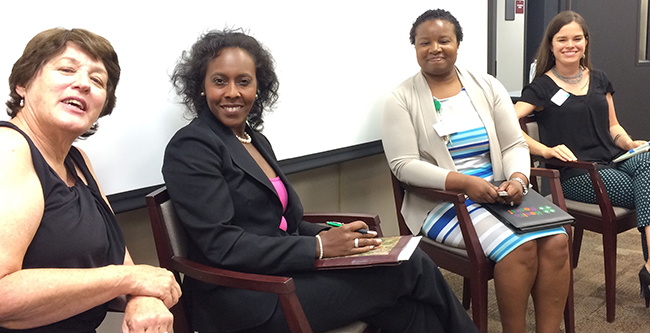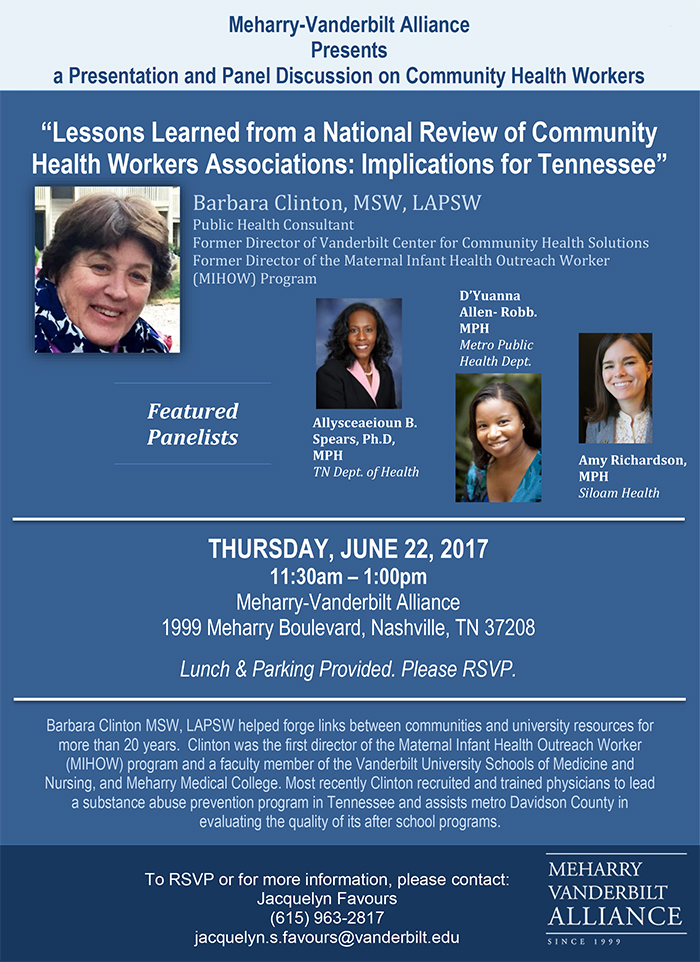
Photo by Jacquelyn Favours, MPH, CHES
Public Health Consultant Barbara Clinton, MSW, LAPSW; Allysceaeioun B. Spears, PhD, MPH from the Tennessee Department of Health; D’Yuanna Allen-Robb, MPH from the Metro Public Health Department; and Amy Richardson, MPH from Siloam Health.
NASHVILLE, Tenn. On June 22, 2017, the Meharry-Vanderbilt Alliance hosted a presentation and panel discussion about Community Health Workers (CHWs) .
Public Health Consultant, Barbara Clinton, MSW, LAPSW was the featured speaker at the panel: “Lessons Learned from a National Review of Community Health Workers Associations: Implications for Tennessee.”. Clinton’s presentation described a national review of CHW associations, examining the various impacts of CHWs and the possibility of such an organization in the state of Tennessee. Clinton, a former faculty member at both the Vanderbilt University Schools of Medicine and Nursing and Meharry Medical College, was the first director of the Maternal Infant Health Outreach Worker (MIHOW) program, a parent-to-parent intervention that uses outreach workers to target economically disadvantaged and geographically and/or socially isolated families with children birth to age 3.
The national review, she explained, included 32 other states’ CHW associations. The general mission of those groups encompassed creating a respected voice for the CHW workforce, informing the public about the role of CHWs and highlighting their impact on health and health care costs.
“They explain and promote the value of CHWs,” Clinton said. “They also share data and stories about CHW impact on health and health costs, they advocate for insurers and government agencies to reimburse CHW services and they maintain strong relationships with stakeholders, insurers and policy makers.”
The bottom line, she noted, is that CHW’s improve health and save money, and CHW associations can increase their effectiveness.
Typical CHW responsibilities include the following:
- Through home visits, group sessions, meetings and other methods to provide guidance and education on health behavior
- Assist with problem solving
- Help people receive the care they need
- Help clients prepare for and follow through after medical encounters
- Advocate for community health needs
- Link people to community resources
In order to launch a possible CHW association in Tennessee, Clinton said the first step – surveying Tennessee CHW programs – is already underway. Afterward, an administrative home would need to be identified, advice sought from stakeholders, and funding options evaluated and objectives identified.
“We want to build interest and find champions,” she noted.
Other panelists included Allysceaeioun B. Spears, PhD, MPH from the Tennessee Department of Health, D’Yuanna Allen-Robb, MPH from the Metro Public Health Department and Amy Richardson, MPH from Siloam Health who shared their experiences with community health worker roles Richardson addressed barriers and strengths to working with CHWs to decrease health disparities amongst Siloam’s immigrant and refugee patient population. Dr.. Spears highlighted the opportunities CHW roles present for early-career public health professionals.
As Allen-Robb stated regarding her experience with Outreach Worker roles building relationships with the community is key. “Change happens at the speed of trust,” Allen-Robb noted, and it is up to the health sector to adapt our models and frameworks to better fit the needs of the communities we serve.

About the Meharry-Vanderbilt Alliance
Founded in 1999, the Alliance bridges the institutions of Meharry Medical College and Vanderbilt University Medical Center. Its mission is to enrich learning and advance clinical research in three primary areas -- community engagement, interprofessional education and research -- by developing and supporting mutually beneficial partnerships between Meharry Medical College, Vanderbilt University Medical Center and the communities they serve. Through community engagement, the Alliance serves a large community of stakeholders including surrounding universities and colleges, community organizations, faith-based outlets and community health centers. Its interprofessional education enhances students' interdisciplinary understanding and improves patient outcomes through integrated care. The research conducted provides access to experienced grant writers and materials supporting the grant application process and facilitates grant-writing workshops.



